First NFC-chip carrier: ‘People use passwords that stopped protecting a long time ago’
37-year-old Evgeny Chereshnev from Voronezh Oblast is a lawyer graduated form MGIMO, worked as journalists, was a businessman and now has been working in Kaspersky Lab for 4 years. A year ago he became the first person in Russia who implanted a NFC chip into his hand. In an interview with Realnoe Vremya, Evgeny Cheryshev told about the possibilities of the technology implanted into his hand, why we cannot live autonomously from the Internet of Things.
'The company did not oblige me to become a guinea pig'
Evgeny, you have been living with your chip for one year. Has the wall of misunderstanding become thinner for this time?
I faced all stages of reactions: negation, resignation, then acceptation – like in books on psychology. Now people around understand more that a computer at home is as important as shower or hob in the kitchen. The concept of Internet of Things becomes clearer for many people, and they start to ask themselves questions like what these 'smart things' should know, about whom and why. This is why it is easier to tell about what I do day after day.
Are you trolled by Russian users less?
Oh, no. It is still in the process. But the Russian users' trolling is a unique thing. I think any technology or innovation just must be trolled because there are very interesting points of view behind sarcasm and seeming negative attitude. Real originals who ask very technological, difficult, tricky questions full of sarcasm are found among the critics. They are not evil, on the contrary, their involvement is really interesting. The thing is that sarcasm is a way of a psychological self-defense from other commentators. I'm glad about such a reaction. Silence on innovation would be disgusting.
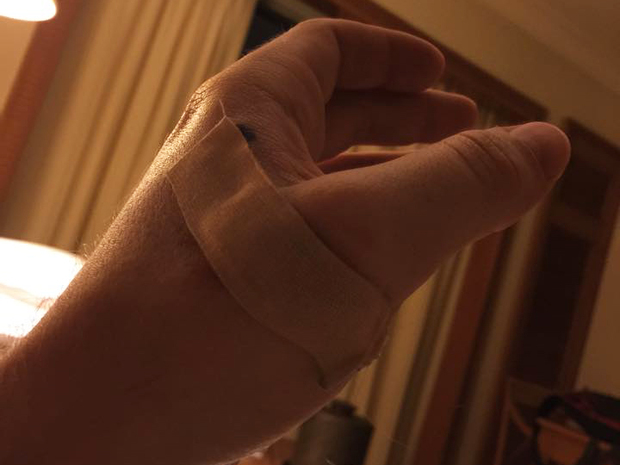
'In principle, I did not hesitate at all but had different scenarios in my head: what if I won't want to live with the chip in six months, but people believed in me so that I would let them down.' Photo: facebook.com/chereshcom – after the implantation of the chip
Implanting the chip, what inhibitions did you have to handle?
The most important obstacle is to be sure psychologically that it is really necessary because the company did not oblige me to become a guinea pig. It is a free will, I could have refused. In principle, I did not hesitate at all but had different scenarios in my head: what if I did not want to live with the chip in six months, but people believed in me so that I would let them down. I had many such psychological aspects in my head, so that when I sat at the table, adrenalin was running high.
Did you really have you chip implanted on the stage during a conference?
Yes, in Concon, on a conference called Security Analyst Summit where the best experts in information safety of the world gathered.
Good PR for the company.
As for PR, yes, it is. But it is not the goal. The thing is that the best experts of this sector gather every year, and the very event is not marketing. It is an intellectual battle where people exchange information and share what they studied. Google, Lockheed Martin, Microsoft, European and Israeli companies come there – the best experts from all over the world. We wanted them to see it and be convinced it was not a joke. We also wanted to keep in touch with them and get a feedback, and we do it. In terms of the partnership of Internet safety, it was a correct step.
How did very Kaspersky react to your idea to implant a chip?
Kaspersky is a cool man, strong engineer and like an elder brother. It is pleasant and easy to talk to him, in spite of the fact that he is a successful person who doesn't care about crazy projects, as it might seem. He also went through all stages: scepticism, misunderstanding and then said: 'Oh… I've got a clue. Maybe. Dig!' Kaspersky thinks his mission is to save the cyber world, no kidding. This is why now his personal focus is on where his expertise is more important – on protection of the critical infrastructure: smart cities, nuclear and hydroelectric power stations and large businesses like banks because very dangerous things like APT (advanced persistent threat), that is to say, complicated spy programmes written by hacker clans individually for companies-victims. It is extremely difficult to detect such threats, while the damage can be estimated at billion dollars. Kasper is keen on it and had a 20-hour working day because he perfectly knows there is just a handful of such experts like he and the team of Kaspersky GReAT, and the fate of the world depends on them, as strange as it might sound.
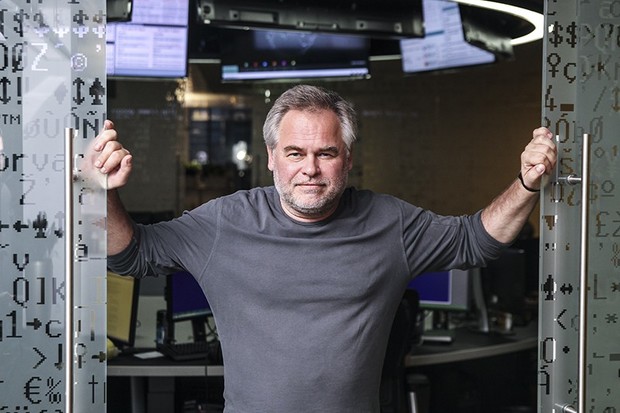
'Kaspersky thinks his mission is to save the cyber world, no kidding. This is why now his personal focus is on where his expertise is more important – on protection of the critical infrastructure: smart cities, nuclear and hydroelectric power stations and large businesses like banks because very dangerous things.' Photo: professionali.ru
'Bio chip doesn't need energy'
Are there any threats to save the information on the chip?
Now it is possible to steal everything. For instance, I will nap on the plane – it is possible to read everything. I mean today. The greatest thing is that we started this experiment earlier. I record everything, share my observations with our anti-virus laboratory, engineering department. They also do their research, estimate the vectors of the threats. So, now we are trying to study different scenarios to make the chip safer.
I set a task for myself: if these chips cannot be avoided, I want to reach such a level of comfort when I am able to recommend it to my family. It is the best guarantee of safety. If I can't recommend the chip to my sister or my mother, I can't recommend it to nobody. I'm not ready now.
Is it safe medically speaking?
It is, of course.
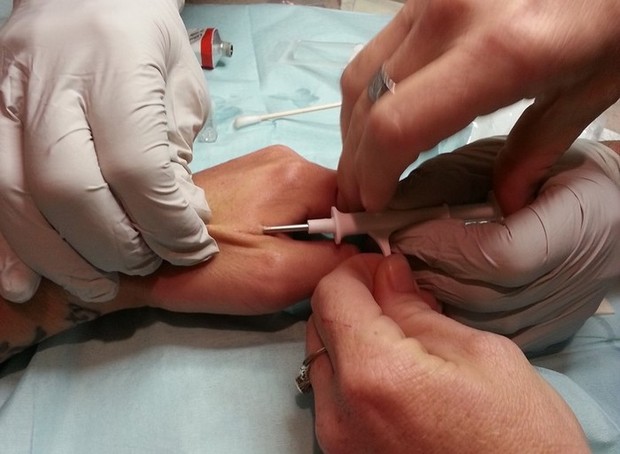
'I set a task for myself: if these chips cannot be avoided, I want to reach such a level of comfort when I am able to recommend it to my family. It is the best guarantee of safety. If I can't recommend the chip to my sister or my mother, I can't recommend it to nobody. I'm not ready.' Photo: nownovate.ru
Price tag
How much did this experiment cost?
The current chip was $100, the very implantation, in my case it was done by a piercing master, was $50.
Who made the chip?
A Scandinavian company. And the components of the chip, naturally, were made in China because all micro schemes cheaper and easier to do there. The main difficulty of the chip is to programme the logic.
What kind of information do you keep on your chip?
It always changes. At present I have Facebook and Twitter accounts, office, room, anti-virus lab, fitness, car keys – mainly they are passwords or keys. And a part of my favourite film Blade Runner.
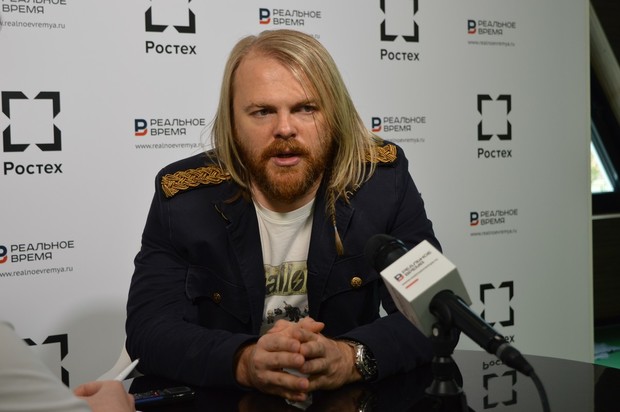
Why do people implant magnets into their fingertips?
There is an unserious question. Does the control system, for example, at the airport, identify your chip?
No. There was a funny story when I got my knee injured in Austria and needed an MRT. In my medical questionnaire, I wrote I had a chip. The whole clinic gathered to talk to me about my sanity (laugh). It was great. We got acquainted with doctors and laughed. It is a novelty for them, of course.
Are there many people in the world and in Russia who implanted chips?
I don't know exactly. I don't think there are many of them in Russia. I personally know about three people. There are several thousands of people in the worlds. There are even crazy people. For example, one of them installed magnets into his fingertips to start to feel magnetic pulses. Somebody changed his retina, another person implanted electrodes into his brain to start to distinguish colours. He managed to do it. He had been seeing the world black and white. Brain starts to perceive this information as true. Brain is the most trainable organ.
'I had my own successful business'
What education did you get?
I'm a lawyer. I worked a bit in this sphere, almost immediately switched to journalism. It seemed to me more interesting. I wrote for leading IT magazines during many years and was the senior editor of some projects like PCMobile and Kommersant-IT. I wrote for many newspapers: Cosmopolitan, Playboy, HQ and HBR; when you are into something, the work is just a pleasure. IT journalism allowed me go into details in software and hardware, know technologies, their evolution and specifics of production and sale.
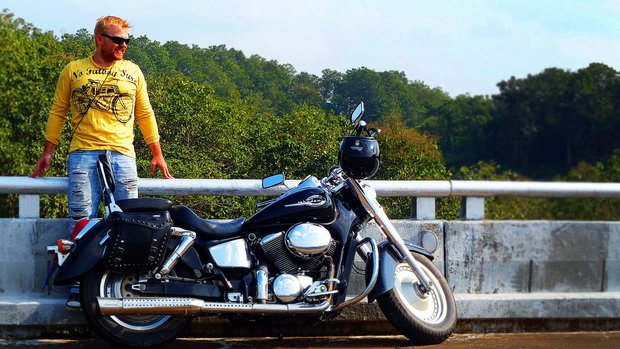
'I like sport, motorcycles, yoga, bouldering. I programme a bit, draw. I'm keen on music… Every one has a hobby.' Photo: facebook.com/chereshcom
Now I occupy different posts. I'm one of the heads of the Communication and SMM-Marketing Department – first, I head a very important for me project called Future Crew. I think innovations and real research are more important and interesting for people than PR based on something else. And the Lab likes and can research.
You probably have different hobbies.
Yes. I like sport, motorcycles, yoga, bouldering. I programme a bit, draw. I'm keen on music… Every one has a hobby.